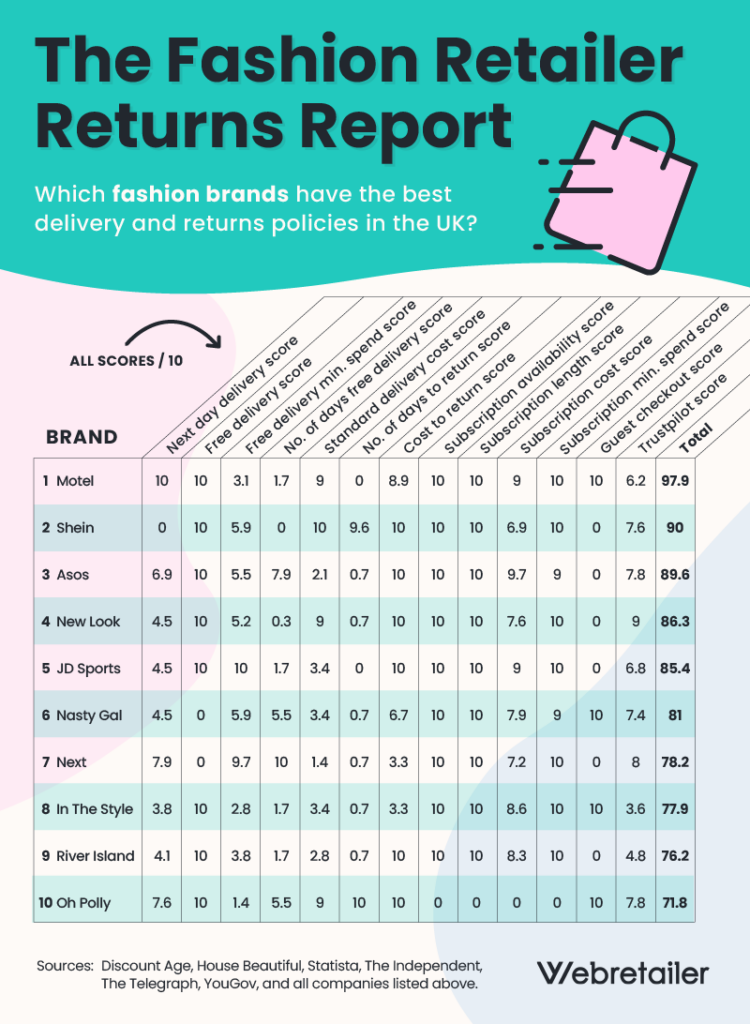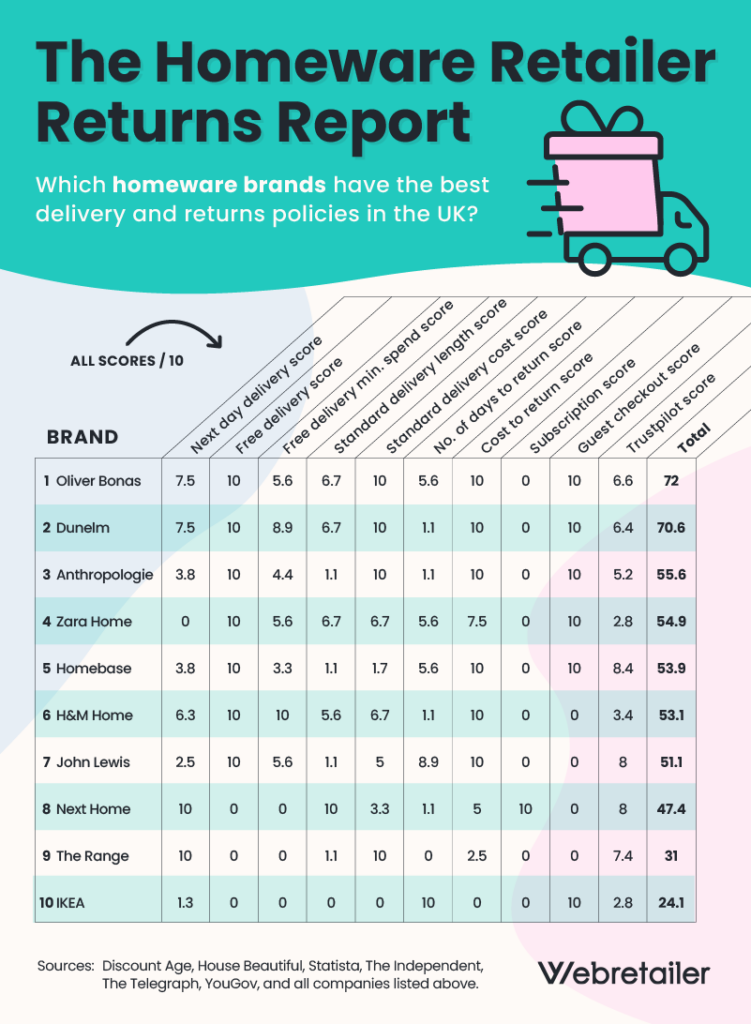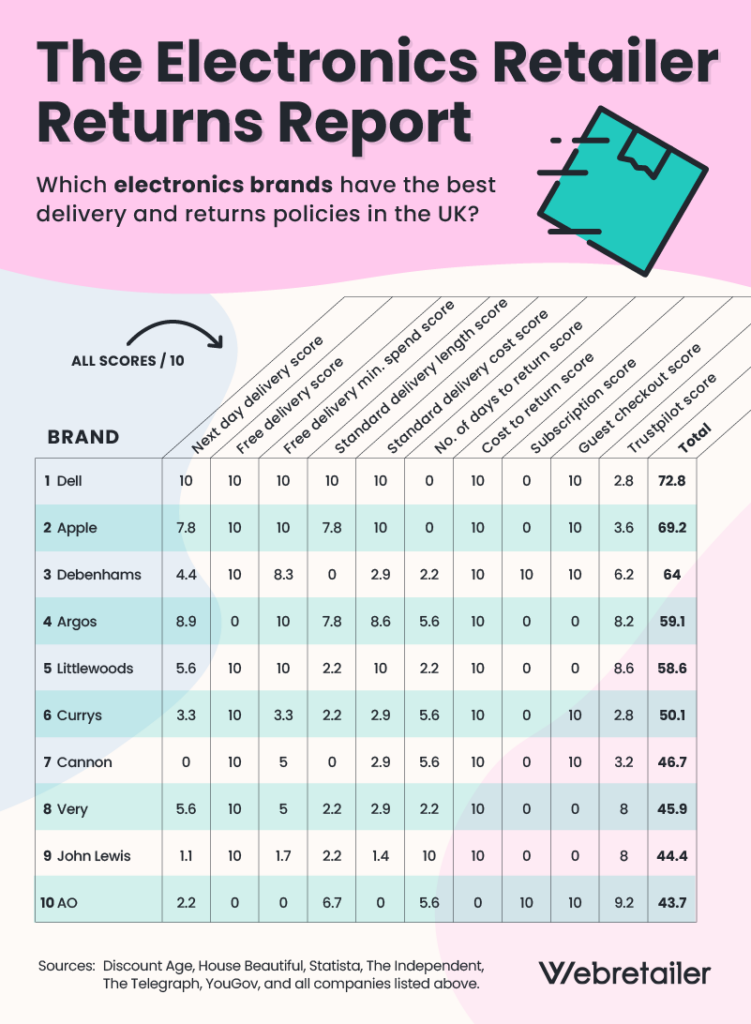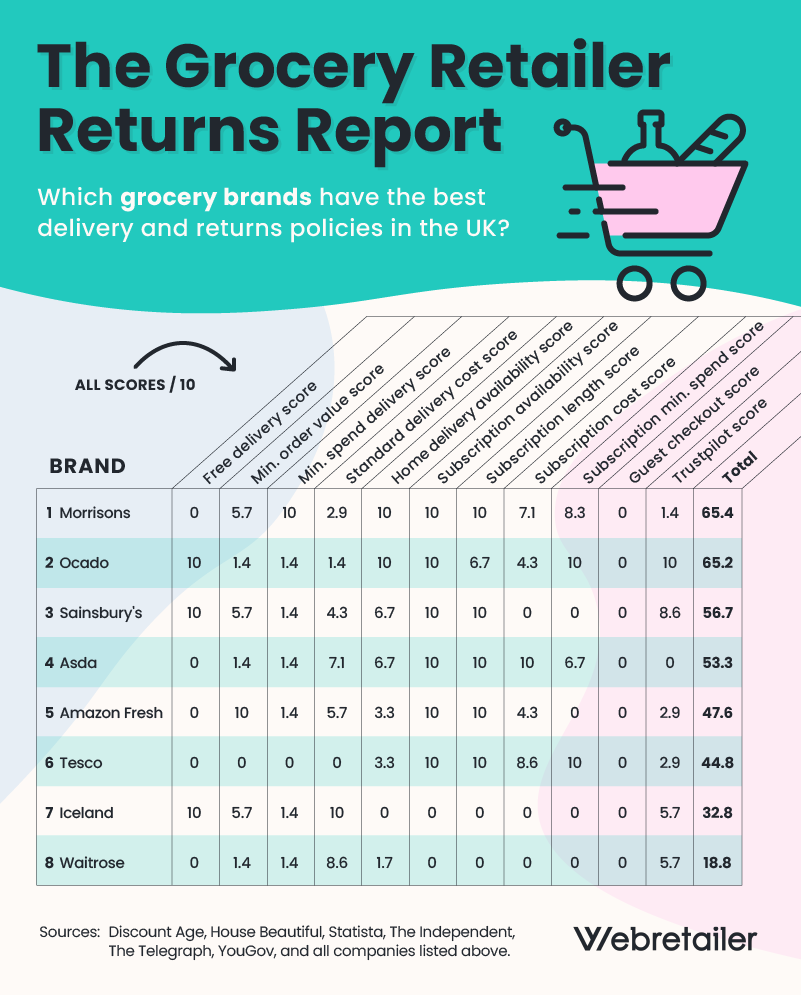Most of us Brits would admit to being loyal to our favourite brands. After all, isn’t it better to stick to what you know? While we are all faced with so many choices when we shop, the time it takes to research the many different options can be a daunting prospect. From a brand’s delivery policies and fees, to how lenient they are with returns and refunds, there’s an awful lot for shoppers to decide on before choosing where to purchase.
However, as the UK continues to struggle with the rising cost of living, it is more important than ever that shoppers hone in on companies that put their customers first regarding delivery and returns.
Throughout the pandemic, online shopping became the norm, and in 2022, it was revealed that online profits were still making up 26.6% of all official retail sales. With everything we need at our fingertips, it is no wonder that people are continuing to make their purchases from the comfort of their own homes – from homeware to clothing, to electronics and even groceries. But which online retailer delivers the best delivery and returns policies?
With this in mind, the e-Commerce experts here at webretailer.com have crunched the numbers on some of the biggest brands, in order to reveal the ones with the most efficient delivery and returns policies. We have revealed data on some of the biggest online retailers’ next-day delivery options, free delivery availability, delivery time, subscription options, guest checkout options, and more.
We have compared and scored companies from four different retail sectors, including fashion, homeware, electronic and grocery suppliers. Because the way we shop online for certain products can be very different, each of these four industries has been scored independently, based on similar but slightly specified factors. After all, buying a new outfit online is very different from doing the weekly supermarket shop, and returning a piece of furniture is a different task from sending back an electronic device.
Let’s take a look at which companies from which industries came out on top in this article.
Which fashion retailer is trend-setting when it comes to delivery and returns?

It is no secret that the fashion industry is extremely competitive, with fashion brands working around the clock to try to provide the most appealing customer experience possible. With lots of brands often jumping on the same fashion trends, these retailers can usually end up offering the same or similar products, increasing the need to stand out in different ways. One such way is by offering the best delivery and returns policies.
Motel came in first with a score of 97.9/120. This was down to a number of factors, most notably their extremely cheap next-day delivery cost of £3.99 – allowing Motel to score 10/10 in this section. Their standard delivery cost (£2.95) also scored them highly (9/10), while their reasonable cost-to-return price of £1.00 obtained 8.9/10. As Motel is an online-only brand, it is imperative that its customer experience is second to none – and thankfully, it seems to be.
Clothing giant SHEIN was next up in second place, scoring 90/120. The online retailer has burst onto the scene since its establishment in 2008, and has truly put the fast into fast fashion. However, despite offering cheap prices on clothing to customers from around the world, the brand has attracted some criticism from environmentalists.
Despite this, its popularity shows no sign of slowing down – possibly due to its efficient customer service. The cost of standard delivery scored them 10/10 (£2.00), while a whopping 45 days to return items scored an impressive 9.6/10. The cost to return items is also free, which allowed SHEIN to achieve 10/10 in this section.
In third, with 89.6/120, was ASOS. Their very respectable subscription price of £9.95 allowed them to score 9.7/10 – cheaper than both SHEIN (£23.96) and Motel (£9.99). The length of their subscription (12 months) also allowed them to score top marks (10/10), highlighting ASOS’s dedication to ensuring their customers remain loyal to them.
Despite their time period to return items only being 28 days, scoring them a measly 0.7/10, ASOS still managed to maintain their third place position by only making their customers wait just 3 days for free delivery – scoring 7.9/10 in this segment.
Interestingly, larger brands such as Dr Martens are a lot further down the list, scoring 58.5/120 and placing them 17th. This could be down to their minimum spend for free delivery being £50.00, scoring them 3.80/10 in this section. Are Dr Martens’ heavy boots contributing to their extra postage costs?
Nike almost finished in last place (23rd out of 25), scoring 47.7/120. Once again, this is surprising to note, as their 2023 third-quarter revenue was a massive $12.4 billion (£9,792,218,000).
Which homeware retailer brings home the best delivery and returns policies?

When it came to homeware, Oliver Bonas came out on top – scoring 72/100. Their cost of standard delivery was a very reasonable £3.95, allowing them to achieve full marks (10/10) in this section.
Oliver Bonas’ standard delivery also takes 3-6 days (6.7/10), while next-day delivery costs only £5.95. When it comes to returning items, Oliver Bonas offers a respectable 30 days to make up your mind – allowing them to score 5.6/10. This, combined with the fact it is free to post returns, helped to secure Oliver Bonas’ spot at the top.
IKEA, despite offering a whopping 365 days to return items (scoring them 10/10 in this segment), came in last place when it came to customer satisfaction. This could be due to the fact that it costs £25.00 to return items, compared to The Range, which is free, but with a postage fee of £2.50.
Dunelm was in second place, scoring 70.6/100. Their cost for next-day delivery is £5.95 – the same as Oliver Bonas. However, if you fancy a free delivery, you only have to spend £49.00 – a far cry from Homebase’s £100.00.
Up in third place was Anthropologie, which achieved 55.6/100. As the overall score for the brands in third and second place were significantly different, we were interested to find out why. In order to obtain free delivery, you would have to spend an eye-watering £75.00 – scoring the brand 4.4/10 in this section. As well as this, standard delivery takes quite a lengthy 3-5 days – a lot longer than Dunelm’s 1-3 days.
Similarly to what we mentioned about Dr Martens, the large difference between free delivery costs of fashion and homeware brands is, most likely, due to the weight of the items being shipped. Homeware items can range from heavy candles, ceramic objects, lamps, kitchenware and more, which is why the difference in cost is unsurprising. However, it is still intriguing to see that some homeware brands, such as Oliver Bonas, are still working to undercut their competitors.
Which electronics retailer is causing a buzz when it comes to returns?

For some, the thrill of walking the aisles of their favourite electronics store, and browsing the latest products is the best part of the shopping experience. For others, the online shopping experience is preferred, especially when customers know that what they ordered will be conveniently turning up at their home just a couple of days after ordering. But which brands are shipping things out the fastest?
In first place was electronics giant Dell, scoring 72.8/100 overall. This is most likely due to Dell’s impressive offer of free next-day delivery – despite the fact that its competitors all charge for it. As a result, Dell scored 10/10 in this category, setting it up as a firm leader. The minimum spend for free delivery is also free (10/10), while standard delivery takes a very speedy 1 day (10/10).
Apple took second place with 69.2/100 overall. With free next-day delivery, Apple was revealed to be one of the cheapest of all the brands analysed – undercutting John Lewis at £7.50 and AO’s average cost of £6.00. Despite this, as we discussed previously, Dell was always destined to come out on top.
However, Apple managed to regain some customer satisfaction with its 1-2 day delivery wait time, scoring it 7.8/10. When it came to how long customers had to return items, both Apple and Dell only offered a disappointing 14 days – scoring both brands 0/10 in this segment. In fact, only John Lewis received full marks in this category, by offering 35 days and scoring 10/10.
Finally, in third place was Debenhams, with 64/100. Despite the fact that Debenhams is now exclusively online (after being acquired by Boohoo in 2021), it still triumphs over electronic retailers that continue to operate on the high street such as Currys (50.1) and John Lewis (44.4).
Debenhams requires a fairly pricey £5.49 for next-day delivery (4.4/10) while also asking for a minimum spend of £15.00 for free delivery, scoring it 8.3/10. While this is not an unreasonable amount to ask for, it cannot compete with Dell and Apple having no minimum cost at all. As well as this, Debenhams has a rather extensive 5-7 day waiting period for standard delivery items – meaning it scored an unremarkable 0/10 for this section. Its standard delivery cost was also £3.99, allowing it to obtain only 2.9/10 in this category.
Which grocery retailer took the cake when it came to returns?

Lastly, we delved into the efficiency of the policies of some of the UK’s most favoured supermarkets – excluding shops such as Lidl and Aldi, as they do not offer delivery options. Due to this, only 8 retailers have been analysed – and the one that took the lead was Morrisons.
The grocery giant, renowned for its impressive salad bar and competitive deals, scored a respectable 65.4/110. This was due to a monthly subscription cost of £5, allowing the store to achieve 7.1/10 in this section, as well as a very reasonable £25 minimum spend for delivery scoring them full marks (10/10) in this segment.
Morrisons also had a very impressive 19 hours available for home delivery, which would make organising a food shop far easier for people with full-time jobs or families. This scored them full marks in the home delivery category, while the only thing that seemed to let them down was a lack of free delivery (0/10).
In second place was Ocado, with 65.2/110 – almost stealing the top spot from Morrisons, especially as Ocado offers free delivery (10/10) and Morrisons does not. However, a rather steep £40.00 minimum spend scored Ocado only 1.4/10 in this category, while a £6.99 cost for standard delivery caused them to receive a measly 1.4/10 in this segment, too. Despite this, 19 hours available for delivery, and also no minimum subscription spend, allowed them to obtain full marks in these sections.
Sainsbury’s came out in third with 56.7/110, with a respectable Trustpilot score of 2.4 allowing them to achieve 8.6/10 in this category. A delivery subscription service lasting a staggering 12 months scored Sainsbury’s 10/10, beating Ocado with its 6-month delivery subscription option.
However, despite this, having only 17 hours available for delivery times dragged the grocery giant’s overall score down, as they only obtained 6.7/10 for this category. Furthermore, a £40.00 minimum spend for delivery (the same as Ocado) could not compete with Morrisons’ £25.00. Sainsbury’s scored 1.4/10 in this section, highlighting why the supermarket was not closer to the top.
Conclusion
The results of this study demonstrate that the way we shop online for different products affects the delivery and returns policies of those industries. While it is common for grocery retailers to offer attractive subscription packages that encourage consumers to return to them every time they do their weekly online food shop, electronics retailers largely do not need to offer any kind of subscription package as most of their customers will be making one-off purchases.
This study has also indicated that a great returns policy can encourage brand loyalty within consumers, particularly for businesses that operate in a niche, such as Dell and Apple which specialise in electronic products like laptops or Dunelm which is known specifically as a homeware retailer. For specialist businesses, having an excellent delivery and returns policy is a subtle indicator to consumers that they are the place to go when purchasing that specific product online.
The results of this study also suggest that businesses operating primarily online tend to prioritise having a generous delivery and returns policy, and businesses that still have a large presence on the high street do not feel the need to offer an overly attractive delivery and returns policy. This is evidenced in the fashion retail industry, where the likes of online-first retailers Shein and Asos scored highly for delivery and returns, whereas fashion retailers you’d be more likely to spot on the high street such as Urban Outfitters and H&M did not make the top ten.
Methodology
We gathered a range of data from Discount Age, House Beautiful Statista, The Independent, The Telegraph and YouGov to devise four separate seed lists demonstrating the top-performing companies from the following four retail industries: fashion, homeware, electronic and grocery suppliers.
This data-gathering process informed us that some industries were much more competitive than others when it came to online shopping, with fashion being the most competitive and grocery suppliers being the least competitive. As such, the number of companies scored within each category was different.
Early research also informed us that the style of the online shopping experience, and subsequently their delivery and return policies, offered by companies from different retail sectors also varied. As such, each industry was scored independently, with similar but slightly stylised factors to suit the conditions of each industry. This meant that the homeware and electronics retailer industries were scored on 10 factors, the grocery retailer industry was scored on 11 factors and the fashion retailer industry was scored on 13 factors. As such a ‘65.4’ (example score) total score in the electronic retailer industry should not be considered equal to a ‘65.4’ total score in the fashion retailer industry.
Leave a Reply